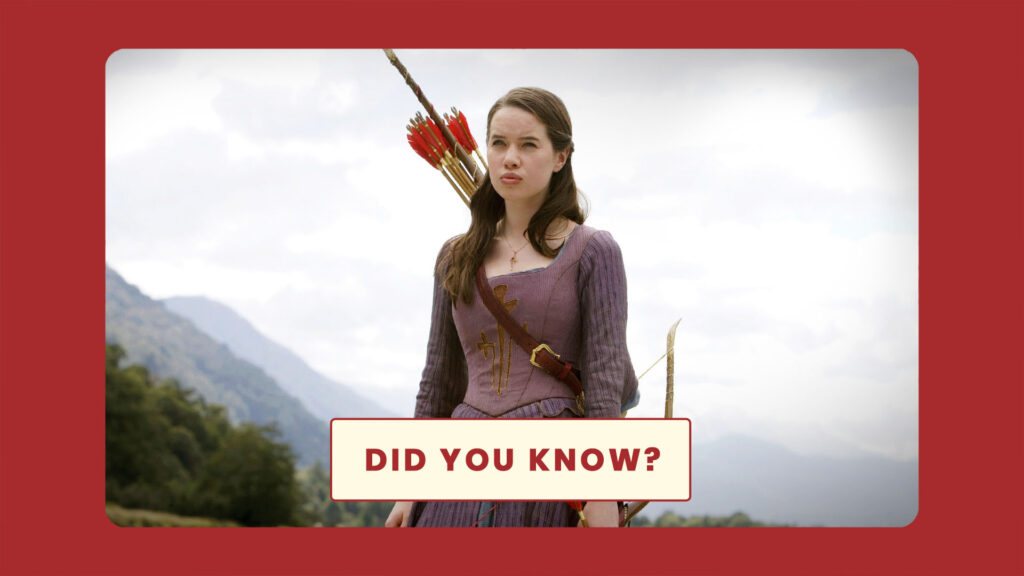What C.S. Lewis Said About Susan’s Fate in The Last Battle

Look for “Did you know” articles on NarniaWeb on the first of every month.
Perhaps the most controversial topic surrounding The Chronicles of Narnia, drawing criticism from the likes of Neil Gaiman, J.K Rowling, and Philip Pullman, is the handling of Susan Pevensie in The Last Battle. It seems everyone has an opinion on Susan’s fate. But what did C.S. Lewis say about her?
“Sire,” said Tirian, when he had greeted all these. “If I have read the chronicle aright, there should be another. Has not your Majesty two sisters? Where is Queen Susan?”
“My sister Susan,” answered Peter shortly and gravely, “is no longer a friend of Narnia.”
The Last Battle
In an early 1955 letter to a girl named Marcia, Lewis first revealed his decision to have Susan lose her way in The Last Battle. “Peter gets back to Narnia in it. I am afraid Susan does not. Haven’t you noticed in the two you have read that she is rather fond of being too grownup? I am sorry to say that side of her got stronger and she forgot about Narnia.”
“The books don’t tell us what happened to Susan. She is left alive in this world at the end, having been turned into a rather silly, conceited young woman. But there is plenty of time for her to mend, and perhaps she will get to Aslan’s country in the end—in her own way. I think that whatever she had seen in Narnia she could (if she was the sort that wanted to) persuade herself, as she grew up, that it was ‘all nonsense’”
Though, contrary to a popular internet rumor, Lewis never planned to finish writing Susan’s story himself. In another letter, he wrote: “I could not write that story myself. Not that I have no hope of Susan’s ever getting to Aslan’s country; but because I have a feeling that the story of her journey would be longer and more like a grown-up novel than I wanted to write. But I may be mistaken. Why not try it yourself?”
These letters (and more) can be found in full in The Collected Letters of C.S. Lewis, Volume 3: Narnia, Cambridge, and Joy which covers his correspondences from 1950 until his death in 1963.
Listen to a discussion about Susan’s choice on Talking Beasts: The Narnia Podcast.






The people who criticize Lewis for the fate of Susan haven’t seen the whole picture. The Narnia books do not say that she was permanently denied entrance into Aslan’s country. J. K. Rowling and Phillip Pullman seem very narrow in their thinking in judging C. S. Lewis. I was never a fan of Harry Potter (actually I know very little about the author or the series). And Phillip Pullman is probably misjudging Lewis since I think that Lewis himself said in his letters that Susan had a chance of being saved.
Although I disagree with the opinion, I respect Gaimen a lot more than the other two as he (at least what I can tell) actually gives Lewis the writing credit he deserves and wrote his own end to Susan’s story (even if I have no desire to read it).
I particularly am not a fan of Pullman’s criticism (can I call it that if it isn’t a proper critique?). Susan is still alive at the end of the books, she was not “sent to Hell” for being interested in boys. And if I may go a step further, he has, on multiple occasions, mentioned that Tolkien was a bad writer because (among other things) LOTR lacked “sexual mystery” because of its lack of women. Which is gross as it implies only women who have sex are worth telling stories about, that that’s some how a give in for the character. As a woman, I feel much more disrespected by Pullman than Lewis when it comes to their thoughts on women’s roles in stories (sorry for the slight rant)
“Why not try it yourself?”
CHALLENGE ACCEPTED! 🙂 😀
It’s probably formed the basis of many a fanfic, but it would be awesome if the Lewis estate would recognize one version as canon.
I love his generosity to his young readers. He actively invited them to engage with his world, fill in the gaps with some of the characters and events that he only made passing references to.
If someone tried to do that with Tolkien’s Lord of the Rings back then, imagine the letter you’d get from him. “How dare you touch my world I’ve spent decades crafting!”
It would certainly be interesting to see Netflix tackle this concept if they should do so
I don’t like the idea of adapters rewriting such a controversial plot point. It strikes me as gutless. But it wouldn’t be a bad idea to include some of what C. S. Lewis wrote in the letter, mainly about Susan potentially getting to the New Narnia in her own way, in the dialogue.
I don’t think they should rewrite her ending, but when they get a glimpse into the Shadowlands at the end, I think we should see Susan at the funeral to at least hint at a possible redemption.
Yes! I completely agree.
Of course, Netflix might just go the book route and NOT show Susan AT ALL in LB, and just stick to Tirian’s POV in the later scenes. Some non-fans would would hate it, as it shrinks the scope of Susan’s ending to Peter etc. telling Tirian about her choices. But it can be done well, and artfully. (I don’t have any examples off the top of my head, but I know it’s possible.)
I have the same enthusiasm, Geekicheep! Though I would’ve loved for Lewis to finish Susan’s story, I feel compelled to finish it myself and, like Susan ‘in my own way’.
Well said! I totally agree.
It’s funny. All the books with glowing endorsements on their covers by Philip Pullman I find to be OK, at best, but not usually worth more than one read, and Narnia and Peter Pan, which he hates, I consider great literature. I hope my saying that doesn’t offend any Pullman fans who read it. You can be a great writer without being a great critic. Sheesh, C. S. Lewis, whose Narnia books Narniawebbers know I love, loved Paradise Lost, which I hate. (Actually, Philip Pullman seems to be a fan of it too. Don’t know what it is about that poem that attracts people so…)
P.S.
Yeah, saying that female characters equate to “sexual mystery” is pretty stupid.
I think there is more to Susan than being “too grown up” – what does that mean anyway? if Lewis was writing to a child – then being too grown up may be bad. If writing for people already grown up – perhaps already “too grown up” – who knows? On a more practical level:
CAN ANYONE TELL ME….. where to get a print copy of Collected Letters Vol 3? The link is to a digital copy and I can only find digital copies… thanks
It’s actually Jill that diagnoses Susan as “too keen on being grownup.” Polly, whom the record will show has a better track record than Jill on being right, thinks Susan needs to be more grownup.
Lewis saw being too grownup as being childish, and that is what Susan was doing. I think he believed that maturity is being very childlike in enjoying things like Narnia and fairy tales. So if you become a child again it can be a good thing, e.g., a childlike faith in God is so much like a real belief in Narnia. And when you do that you have grown much older and wiser.
“When I was ten, I read fairy tales in secret and would have been ashamed if I had been found doing so. Now that I am fifty I read them openly. When I became a man I put away childish things, including the fear of childishness and the desire to be very grown up.”
–C. S. Lewis, “On Three Ways of Writing for Children”
I actually think Jack Lewis did gave us the answer to Susan’s fate, not in the Chronicles, but in one of his last books, Till we have Faces, through the character of Orual.
Orual just seems the perfect answer, her redemption is Susan’s salvation. Both were queens of their countries, both caught a glimpse of the Divine (Aslan, Cupid and Venus), and both had younger sisters who had a close bond with the Divine (Lucy with Aslan, Psyche with Cupid).
Orual is a complex and complicated mature answer to Susan. And both were guilty of taking pride in their adulthood, as both condescendingly treated their young sisters like children.
The point about Susan’s obsession with being “grown up” is that she was keen on being the wrong sort of grown up, the silly immature flighty sort of young woman, who she had somehow come to admire.
@Sam Victors, I like the idea of her story being retold in Till We Have Faces.
There has also been a suggestion that the character Jane, in That Hideous Strength (the third of the space trilogy), also shows an older Susan-type, who experiences some redemption in that book (written before Susan was created, mind you!). Perhaps the reason Lewis didn’t complete her story is that he had already written it?
Interesting comparisons people are making between Susan and some of C. S. Lewis’s adult female characters. I’m not sure if they really make sense though, at least not to extent being suggested. Jane Studdock seems like someone who would have avoided talking about nylons and lipsticks, fearing that would have made her seem stereotypically feminine. And Orual, rather than being beautiful, had a face that could stop a clock, and rather than wanting to avoid hurting people emotionally or physically, was harsh to the point of cruelty. (To be fair, her culture kind of demanded she be.) You could certainly say that all three characters are portrayed as needing to humbled though. (Since at least two-maybe all three-characterizations have been criticized for being misogynistic, it’s worth noting many of the author’s male characters, especially in the Chronicles of Narnia, are portrayed as needing the same thing.)
Why not think of them as a mirror version of Susan?
Perhaps not the same characteristics or personality, but similar emotional and flawed traits, and a redemptive arc that could possibly parallel to Susan’s. I see Orual as reflecting humanity’s ugly corruption, while Susan is humanity’s shallow vanity.
I legit want to do this. I’ve been wondering whether to try to ‘file the serial numbers off’ or whether I could get away with publishing it in as more obviously what the story would be. (Probably the latter, but I wonder if this quote could be used as a decent argument that other authors should be able to write and publish books on this topic.) I would certainly never recognize any such book as canon since it’s not written by Lewis himself (I personally don’t think that people who aren’t the original creator, whatever their legal rights, really have the moral right to declare things canon that the author didn’t create or cause to be created.), but as a writer I would love to get my own version of it out there.
This makes me so happy and there is a truthyness to this. That there is an invitation to write Susan’s story. Wouldn’t it be an amazing tale how an older Susan get’s disenchanted with the “real” world the older she get’s, and in turn finds her own way back to Narnia. What a remarkable tale that would be. Sometimes things take the long way round.
A lot of people who wander from their faith return in later years, so I fully believe that Susan could return. Conversely, I’ve always found Rowling, Gaiman, and Pullman to be full of hot air, so I hold a very dim view of their opinions on the matter. The Last Battle is far from being my favorite Narnia novel (Silver Chair, Horse and His Boy, and Magician’s Nephew being my top 3), but I still love it, and hate to have it ripped to pieces by inferior modern authors.
Anyone who says Tolkien is a bad author is clueless. I feel no remorse about saying that Pullman’s opinion is objectively wrong, and I agree it stinks of sexism.
My difficulty with the end of the Last Battle is NOT the question of whether Susan will ever get back to Narnia (i.e., go to heaven) after she dies. It is the abominable cruelty of what Lewis does to her in THIS world. She is a young woman in her early 20s who loses her whole family. Her parents; her siblings; her cousin Eustace; her family friends (Digory, Polly, and Jill) — all wiped out in one horrific train wreck. As better writers than I have pointed out, she would have had to identify her family’s bodies. She is left all alone, barely in adulthood, to deal with the grief of losing her entire family, and to live with the memories of their deaths for the rest of her life — maybe 60 or 70 years.. And yet Lewis seems to expect that we will not even think about this, that we’ll just accept that because she grew up to be rather silly and shallow, it’s okay for him to hit her with that sort of devastating tragedy. Worse, this sort of horrible catastrophe wouldn’t be merely theoretical to Lewis. There were people in England in WWII who did lose their entire families during the Blitz–if you happened to be away from home when the bomb hit, you could come back to find your whole family and several neighbors dead. Anyone in England during the Blitz knew of such cases. So Lewis KNEW the horror he was loading onto Susan, and it doesn’t seem to have bothered him. Well, it’s bothered me, ever since I first read the books as a child, and it bothers me even more now. It’s a real blemish on the whole Narnia series for me.